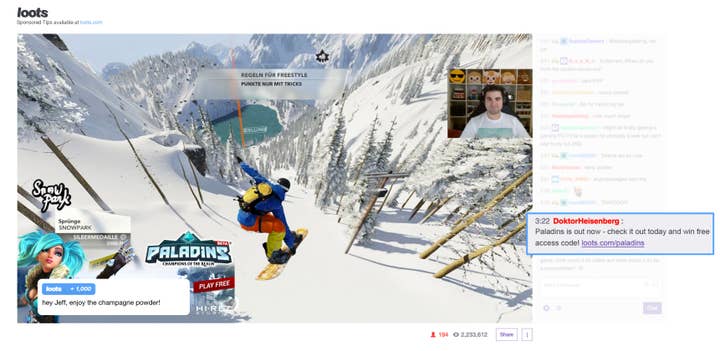"Notorious $5000 deals with YouTubers and streamers will fade. It's a matter of honesty"
Loots co-founder Marc Fuehnen discusses the increasing need for transparency when marketing through influencers
There has been a major shift in how consumers access games coverage, and by extension how publishers and other marketers access those consumers.
Video is the now well-established king of getting eyeballs on your game, and the oft-touted 'influencers' are the masters of this market. But as the audience for YouTubers and Twitch streamers grows, so do the needs of advertisers.
"The industry's need to communicate through marketing has increased a lot," Marc Fuehnen, co-founder and CEO of Loots, tells GamesIndustry.biz. "The total number of product releases reached new highs in 2016, visibility in digital distribution is very limited, we see high volatility in prices, and on top of that an increasing number of DLC releases, free updates, patches. All of that information needs to find an audience, and if that audience moves to different channels the industry needs to find ways to follow.

"In 2015, it was clear that live streaming of gaming content, tolerated by developers and publishers, is here to stay and that live audiences are of great value for advertisers. Today, the industry's interest in influencers is higher than ever - but focus and dealing have changed significantly over time.
"What started out as a small group of internet celebrities and strong opinion leaders in specific fields has developed into more of a standalone media category today. For example, in 2013 the endorsement of a single Minecraft Lets-Player might have caused enough attention to leave a visible footprint in that community. Today we see literally hundreds of Minecraft Lets-Players, audiences split up among channels and the individual deal has lost most of its value."
The growth of this new media category, however, has made it increasingly hard for the PR and marketing teams at games publishers to manage all the influencers they reach out to and work with. Rising marketing costs and the need to compensate for impressions lost in other areas of the games media also add to the pressure. Fuehnen says in this situation, the past approach of building direct relationships and negotiating individual endorsement deals "simply doesn't scale anymore".
There's another issue when it comes to marketing around influencers: while YouTubers earn from not only publisher deals but also advertising around their videos, Twitch streamers have much more limited ways of monetising their content, and therefore maintaining these valuable channels.
"Today, the industry's interest in influencers is higher than ever - but focus and dealing have changed significantly over time"
"In 2016, we roughly saw 3.6m streamers going live in gaming, across all major networks, but less than 1% of this group have real access to monetisation," says Fuehnen. "The network's partner programs often require significant viewer numbers, sponsorships are available only for the top 1% of the 1%."
Enter Loots, Fuehnen's new venture with colleague Brian Muldown. Both coders, the duo turned their talents to coming up with a solution specifically aimed at live streaming that would help channels monetise and marketers access these audiences.
The premise is simple. One of the few ways streamers can monetise is asking for donations and "real dollar tips" from viewers. With Loots, viewers still send these donations and tips but it's the advertiser that pays for them. Donators' messages still appear on the stream, now surrounded by an advertisement with a link for anyone wishing to purchase that product.
"All parties win," Fuehnen claims. "Viewers don't need to spend their own money any more, streamers gain a new revenue channel and advertisers get access, are visible and even clickable during the live stream."
The service launched in August with the plan of having 100 broadcasters signed up by the end of 2016. Instead, that goal was reached within a fortnight and Loots had more than 4,000 streamers on board by the year's end. 30,000 tips are currently sent every day, pushing those branded messages to more than 15m viewers.
"Bad news hurts both parties, but it's the channels that take the most damage. Once you lose trust in a broadcaster it's hard to have fun with him, or accept any recommendations."
Loots has also been able to secure notable partners from the games industry. Bethesda used the system to advertise Skyrim and Dishonored 2, Bandai Namco pushed the Ashes of Ariandel DLC for Dark Souls 3 and Gameforge attached Dropzone beta keys to every message. These branded tips messages are even being used to push hardware thanks to a partnership with Razer.
Crucially, it is always made abundantly clear that these messages are ads and in no way interfere with the content. Just because Bethesda is advertising Skyirm every time someone donates does not mean the streamer is obliged to play this or any other Elder Scrolls game. Loots has taken care to ensure the ads and the relationship with streamers is as transparent as possible.
"All tip messages come with campaign art and logos, they contain clear calls to action and and go by the name of 'Sponsored Tips'," explains Fuehnen. "Streamers themselves promote loots verbally/visually as 'donations that are free because of ads displayed in the background'.
"The financial model behind sponsored tips is publicly documented. Streamers are free to give away their exact numbers/earnings to third parties at any time, we do not demand/enforce secrecy or even NDAs."

It's an important point to clarify in an age where YouTubers in particular are under scrutiny. Numerous cases have emerged over the past few years where marketing deals have been made between channel hosts and publishers but not publicly disclosed. While agencies around the world are better defining what counts as advertising and product placement when it comes to social media, it's still the games industry's responsibility to hold itself to higher standards if further controversies are to be avoided - something Fuehnen says many companies are taking to heart.
"The notorious $5000 influencer deals where Agency X offers Streamer Y playing Game Z will fade"
"While influencers might not face consequences other than formal takedown notices, at the corporate level transparency has now become a legal requirement for advertising in the influencer space," says Fuehnen.
"On the streamer side things changed dramatically in late 2015 when the total number of broadcasters exploded across networks - as a result building an audience has become the hardest thing to do. That also means that an existing viewership has become the most valuable asset and many broadcasters live in constant fear to lose it because re-building it today seems to be impossible. This has changed drastically the way broadcasters treat their audience. Quality is now state of the art, streaming has become a matter of honesty, transparency about sources of revenue an important differentiator."
News of undisclosed deals are often widely covered by the traditional games press in particular - in some cases out of self-interest to prove the new channels that have stolen their readerships aren't as infallible as many consumers believe. When such stories emerge, Fuehnen says the "bad news hurts both parties, but it's the channels that take the most damage".
"They will lose audiences that they most likely cannot regain because the relationship between the most loyal viewers and the broadcaster is a very personal one," he explains. "Once you lose trust in a broadcaster it's hard to have fun with him, or accept any recommendations."
The relationship between publishers and those YouTubers and streamers that offer such valuable audiences is maturing - on both sides - to the point where Fuehnen expects scandals of undisclosed partnerships to become a thing of the past. Alternative services such as Loots offer a more honest way to advertise and one more in keeping with the personas stream and video hosts intend to present.
"The notorious $5000 influencer deals where Agency X offers Streamer Y playing Game Z for two hours while tweeting about it will fade," says Fuehnen, adding: "The increasing scale of the influencer category will make automation one of the biggest trends in 2017. Advertiser demand for reliable targeting and live performance tracking will rise significantly."
